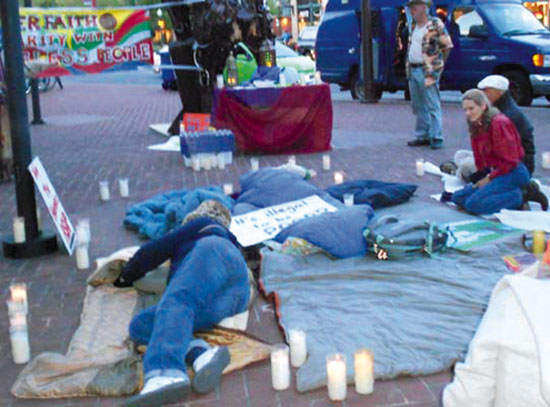A Column on Human Rights
by Carol Denney
Service providers train like Olympic athletes for the moment in spring when the City of Berkeley allows the sweet smell of a small pot of money to drift under their nostrils. Coupled with a city manager’s dry recommendation that their program get zero funding, any previously vocal political opposition to repressive anti-homeless policies starts to get the soft-pedal in case it can save their already cut-to-the-bone program and an already scrambled handful of jobs.
Berkeley consistently brags about its somewhat mythological tradition of compassion for the poor, a compassion not entirely extinguished. There are still a handful of shelter beds, yet it adds up to a pretty stagnant, inadequate number in a landscape where people have come to assume their parks, freeway overpasses, and any vacant space will inevitably become, at least temporarily, somebody’s home.
Officials in Utah announced recently that they had reduced their “chronically homeless” population by 91 percent with a Housing First policy which gave people housing and social work assistance at a cost of $11,000 annually, much less than the $17,000 estimated price of hospital visits and jail and court costs. But Berkeley officials are strangely silent on Housing First policies.
It isn’t that the efficacy of Housing First doesn’t shine like a diamond in the sea of ineffective and broken policies related to poverty, joblessness, homelessness, mental illness, drug abuse, etc. The Berkeley City Council is no different than other city councils nationwide. Its members are a relatively intelligent crew, even compassionate if you’re willing to include slipping a dollar (a whole dollar!) into the new “Positive Change” donation boxes downtown.
But the entire “service provider” network is designed to help people get off the street, maybe get a bowl of soup, and find housing somewhere else in some other town — but not in Berkeley.
The little donation boxes downtown? Free bus tickets — out of town. Evicted with nowhere to go? Service providers will help you find scarce shelter space — in Richmond. People put through the traditional police wringer who find themselves either in the court system, or the mental health sleighride, or both, will find themselves in Oakland or Dublin — not in Berkeley — which makes them somebody else’s problem.
Our present housing policy angles toward housing for a group that makes $74,000, or 80 percent of an Alameda County Median Income listed as $92,900.

Whatever housing crisis is faced by the $74,000-a-year crowd, it hardly compares to having all your worldly belongings hurled into a trash compactor because you made the mistake of finding a real bathroom in which to pee and wash up, as happens consistently to people in Berkeley.
It’s pretty simple, really. If you’re on the City Council, you align yourself with the service providers who have learned that the only acceptable thing to say about people shipwrecked on our streets is what a shame it is when they spend money on booze — as the shrewd service provider says while hoisting a trendy cocktail with the Downtown Berkeley Association (DBA) at their ghost town of an annual meeting so that you have some political cover.
From there you barely have to say a word. You’ll be surrounded with developers and property owners (the majority of the DBA board) who will even write the next round of anti-homeless laws for you as they just did with the upcoming anti-blanket law. Because they care, they really care — about turning our common spaces into flowerpot-pocked Disneylands while converting what’s left of our housing to condos.
Berkeley’s commitment thus far is to nod vigorously at the practicality and morality of Housing First policies, and to “ooh” and “aah” over Utah’s and Arizona’s successes, while making sure that any actual housing produced in the city is limited to the not-quite-in-our-echelon-yet-but-trying crowd stuck at around $75,000 a year where season tickets to the theater compete with the family reunion at Leech Lake. You’re not there yet? Well, then, best of luck. And if not, see you under the bridge!
